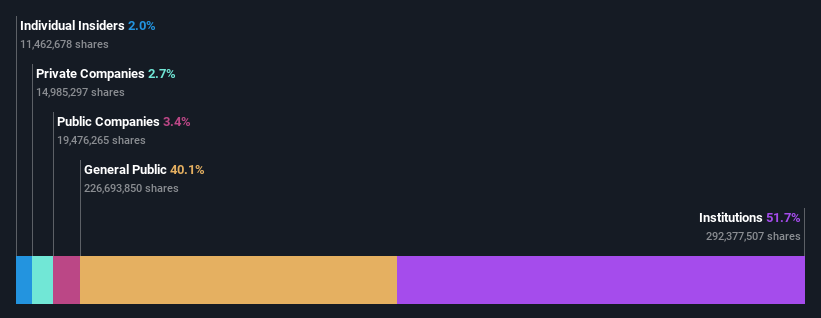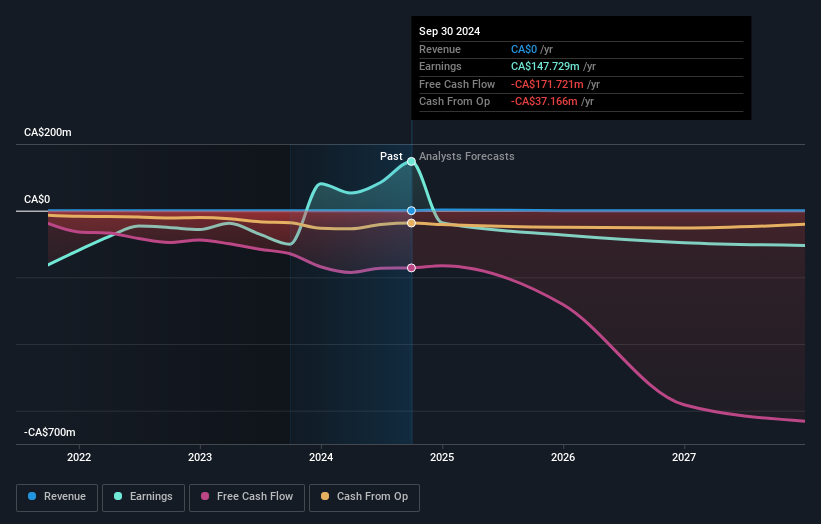- Canada
- /
- Oil and Gas
- /
- TSX:NXE
Institutional shareholders may be less affected by NexGen Energy Ltd.'s (TSE:NXE) pullback last week after a year of 5.1% returns

Key Insights
- Given the large stake in the stock by institutions, NexGen Energy's stock price might be vulnerable to their trading decisions
- 42% of the business is held by the top 25 shareholders
- Recent sales by insiders
A look at the shareholders of NexGen Energy Ltd. (TSE:NXE) can tell us which group is most powerful. We can see that institutions own the lion's share in the company with 52% ownership. That is, the group stands to benefit the most if the stock rises (or lose the most if there is a downturn).
Institutional investors was the group most impacted after the company's market cap fell to CA$5.4b last week. Still, the 5.1% one-year gains may have helped mitigate their overall losses. They should, however, be mindful of further losses in the future.
Let's take a closer look to see what the different types of shareholders can tell us about NexGen Energy.
Check out our latest analysis for NexGen Energy

What Does The Institutional Ownership Tell Us About NexGen Energy?
Institutions typically measure themselves against a benchmark when reporting to their own investors, so they often become more enthusiastic about a stock once it's included in a major index. We would expect most companies to have some institutions on the register, especially if they are growing.
NexGen Energy already has institutions on the share registry. Indeed, they own a respectable stake in the company. This suggests some credibility amongst professional investors. But we can't rely on that fact alone since institutions make bad investments sometimes, just like everyone does. If multiple institutions change their view on a stock at the same time, you could see the share price drop fast. It's therefore worth looking at NexGen Energy's earnings history below. Of course, the future is what really matters.

Since institutional investors own more than half the issued stock, the board will likely have to pay attention to their preferences. NexGen Energy is not owned by hedge funds. Looking at our data, we can see that the largest shareholder is Mirae Asset Global Investments Co., Ltd. with 6.1% of shares outstanding. In comparison, the second and third largest shareholders hold about 5.4% and 3.6% of the stock. Additionally, the company's CEO Leigh Curyer directly holds 1.0% of the total shares outstanding.
Our studies suggest that the top 25 shareholders collectively control less than half of the company's shares, meaning that the company's shares are widely disseminated and there is no dominant shareholder.
While it makes sense to study institutional ownership data for a company, it also makes sense to study analyst sentiments to know which way the wind is blowing. There are a reasonable number of analysts covering the stock, so it might be useful to find out their aggregate view on the future.
Insider Ownership Of NexGen Energy
The definition of an insider can differ slightly between different countries, but members of the board of directors always count. Management ultimately answers to the board. However, it is not uncommon for managers to be executive board members, especially if they are a founder or the CEO.
Most consider insider ownership a positive because it can indicate the board is well aligned with other shareholders. However, on some occasions too much power is concentrated within this group.
We can report that insiders do own shares in NexGen Energy Ltd.. The insiders have a meaningful stake worth CA$110m. Most would see this as a real positive. Most would say this shows alignment of interests between shareholders and the board. Still, it might be worth checking if those insiders have been selling.
General Public Ownership
The general public-- including retail investors -- own 40% stake in the company, and hence can't easily be ignored. This size of ownership, while considerable, may not be enough to change company policy if the decision is not in sync with other large shareholders.
Public Company Ownership
Public companies currently own 3.4% of NexGen Energy stock. This may be a strategic interest and the two companies may have related business interests. It could be that they have de-merged. This holding is probably worth investigating further.
Next Steps:
While it is well worth considering the different groups that own a company, there are other factors that are even more important. Take risks for example - NexGen Energy has 5 warning signs (and 3 which don't sit too well with us) we think you should know about.
Ultimately the future is most important. You can access this free report on analyst forecasts for the company.
NB: Figures in this article are calculated using data from the last twelve months, which refer to the 12-month period ending on the last date of the month the financial statement is dated. This may not be consistent with full year annual report figures.
Valuation is complex, but we're here to simplify it.
Discover if NexGen Energy might be undervalued or overvalued with our detailed analysis, featuring fair value estimates, potential risks, dividends, insider trades, and its financial condition.
Access Free AnalysisHave feedback on this article? Concerned about the content? Get in touch with us directly. Alternatively, email editorial-team (at) simplywallst.com.
This article by Simply Wall St is general in nature. We provide commentary based on historical data and analyst forecasts only using an unbiased methodology and our articles are not intended to be financial advice. It does not constitute a recommendation to buy or sell any stock, and does not take account of your objectives, or your financial situation. We aim to bring you long-term focused analysis driven by fundamental data. Note that our analysis may not factor in the latest price-sensitive company announcements or qualitative material. Simply Wall St has no position in any stocks mentioned.
About TSX:NXE
NexGen Energy
An exploration and development stage company, engages in the acquisition, exploration, and evaluation and development of uranium properties in Canada.
High growth potential with adequate balance sheet.
Similar Companies
Market Insights
Community Narratives



